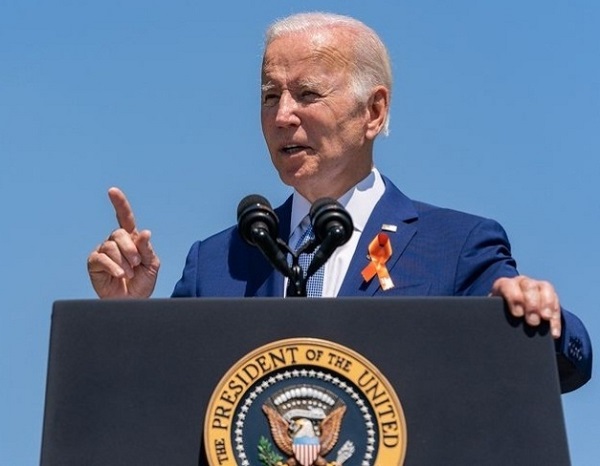Washington, (Asian independent) US President Joe Biden’s inflation reduction legislation has got the much-needed push with Sen. Kyrsten Sinema, D-Ariz., saying she would “move forward” on a sweeping package of initiatives to combat climate change, lower drug prices, and pare back the deficit, giving Democrats the necessary votes in the senate.
The Inflation Reduction Act, for which Sinema had held back support, now has the way clear as she has negotiated the removal of a provision to increase taxes on carried interests targeting wealthy investors, resolving a key difference that had held back , according to media reports.
“Subject to the parliamentarian’s review, I’ll move forward,” Sinema said in a statement.
With her backing , the scene is set for a final version of the bill to be introduced on Saturday, and the likelihood of a major legislative win for President Joe Biden after the string of success he has enjoyed on the semiconductor bill freeing US from importing CHIPS from China, the climate change bill mustering Sen Manchin’s support.
The Senate needs 51 votes to pass legislation with VP Kamala Hariss’ tie breaking vote and avoid the threshold 60 votes needed to prevent a republican filibuster.
Democrats number 48, which means all democrats need to vote together and Republicans have 50 senators which gives the republicans an edge.
Senate Majority Leader Chuck Schumer, D-N.Y., said he’s “pleased to report that we have reached an agreement on the Inflation Reduction Act that I believe will receive the support of the entire Senate Democratic conference”.
Sinema’s agreement with Schumer includes a new excise tax on stock buybacks that would bring in more tax revenue than the carried interest provision, according to a Democratic source familiar with the negotiations, media reports say.
Democrats hope to pass the bill on a party-line vote through a process known as budget reconciliation that would allow approval with a simple majority and avoid the 60-vote threshold to overcome a Republican filibuster. It would need the votes of all Democrats in the evenly divided Senate and then a tie-breaking vote by Vice President Kamala Harris.
The Senate parliamentarian is reviewing the bill to determine whether it can be considered under the reconciliation rules and is expected to issue a decision soon, media reports say.
“Tonight, we’ve taken another critical step toward reducing inflation and the cost of living for America’s families,” Biden said in a statement late on Thursday.
“I look forward to the Senate taking up this legislation and passing it as soon as possible.”
Sinema, a thorn to the White House on several policy proposals over the past year, had refused to talk about the legislation publicly for more than a week since Sen. Joe Manchin, D-W.Va. and Schumer announced a deal on the Inflation Reduction Act.
The legislation would allow Medicare to negotiate prescription drug prices — long opposed by the pharmaceutical industry — and extend Affordable Care Act subsidies through 2025.
To address climate change, the bill would provide billions in tax credits to develop and expand clean energy transmission infrastructure including programs to help Americans buy electric vehicles that would help Biden’s goal of significant cabin carbon emissions reduction over the decade.
To pay for the measures, the bill would establish a 15 per cent corporate minimum tax and beef up enforcement of the Internal Revenue Service, reports said.
The bill would raise an estimated $739 billion in new tax revenue, more than offsetting the $433 billion in proposed new spending. The legislation would decrease the federal deficit by $102 billion over the next decade, according to the Congressional Budget Office.
Manchin and Sinema last year opposed several measures in Biden’s more expansive Build Back Better legislation that sought to overhaul the social safety net, leading to the bill getting stuck. They also opposed the president’s push for carve-outs to the Senate filibuster to pass voting reforms and protect abortion rights.
Meanwhile, the US Bureau of Labour Statistics released a press statement showing that total nonfarm payroll employment rose by 528,000 in July, and the unemployment rate edged down to 3.5 per cent, giving impetus to Biden’s argument that jobs situation was good and there was no fear of the economy going into a recession.








